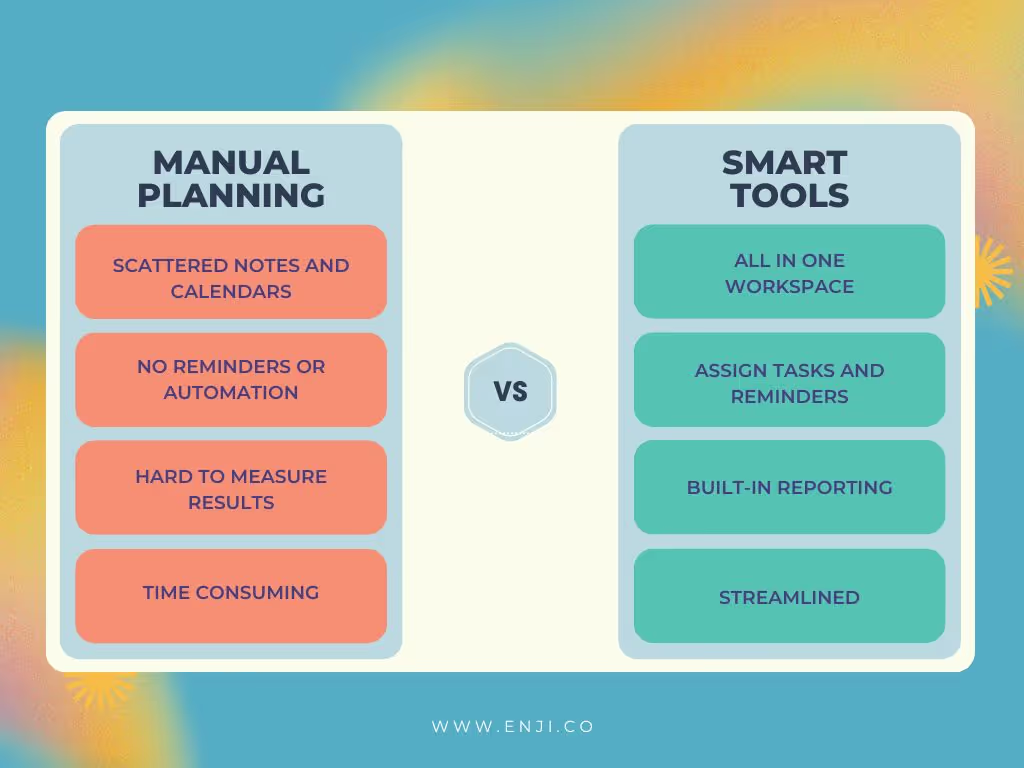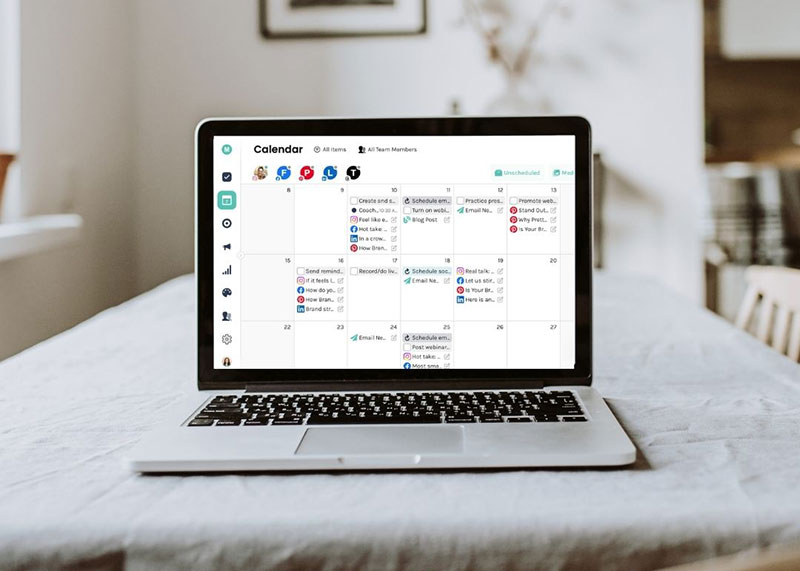When you're running a small business, marketing can feel like one more thing on a never-ending to-do list. Between serving clients, handling operations, and trying to stay afloat, it’s tough to find time for marketing, let alone build a full marketing plan from scratch. But without a plan, it’s easy to end up in reactive mode, scrambling for content ideas or launching campaigns without a clear goal.
Thankfully, you don’t have to do it all on your own. That’s where marketing planning tools can help.
Marketing planning tools for small businesses (like Enji!) help small businesses like yours take control of your marketing. Instead of guessing what to do next or jumping between apps, you get a streamlined system to map out your goals, plan campaigns, schedule social media posts, track what’s working, and more. The right marketing planning tool doesn’t just keep you organized, it helps you stay focused on what matters and stop wasting time on what doesn’t.
In this post, we’ll break down what marketing planning tools actually do, the features that make them most useful for solo business owners or or folks leading a small team, and how they compare to manual planning. We’ll also show you how Enji—our all-in-one marketing platform—makes it easier to plan smarter, execute faster, and grow with less guesswork.
Ready to market with more confidence? Let’s dive in!
- What are marketing planning tools?
- Why small businesses need smarter tools, not just more to-do lists
- The top features to look out for in a marketing planning tool
- Manual planning vs. smart tools
- How Enji simplifies marketing planning for small business
What Are Marketing Planning Tools?
Marketing planning tools are software platforms designed to help you plan, do, and review your marketing strategy in one place. Instead of juggling spreadsheets, sticky notes, and separate apps for content, tasks, and analytics, these tools give you a centralized hub to plan campaigns, assign responsibilities, and track performance.
Whether you're running a solo business or leading a small team, a marketing planning tool acts like your behind-the-scenes marketing coordinator. You can map out your goals, schedule content, and track results without getting overwhelmed by all the moving pieces.
Marketing planning tools also simplify what’s often an overwhelming process. Let’s be honest, there’s a lot of noise out there telling you what you “should” do to market your business. Instead, with a solid marketing planning tool, you can document the marketing you need to do (which isn’t everything), which efforts are paying off, and what adjustments need to be made. And when your marketing plan doesn’t just live in your head, it’s easier to understand and it's easier to get done, regardless of whether you’re working alone or collaborating with others.
Plus, the best marketing planning software or tools are designed to grow with your business. What you might start using as a simple content calendar today can evolve into a full campaign management system tomorrow, without the need for a complete overhaul.
Why Small Businesses Need Smarter Tools, Not Just More To-Do Lists
When you're running a small business, marketing often ends up on the back burner. You know it matters, but between client work, admin tasks, and trying to live your life, who has time to write a strategy from scratch or dig through multiple platforms just to see what's working?
Plus, let’s be honest, it’s the one thing you can let slip and nobody is going to be mad at you for it.
Planning your marketing manually (using a Google doc or pen and paper) may seem scrappy and affordable at first, but it often leads to burnout, inconsistency, and wasted effort. Because the hardest way to market your business is for free. You end up reacting instead of strategizing, and it’s hard to connect your efforts to real results.
That’s where smarter marketing tools come in. They remove the guesswork and help you:
- Save time by organizing all your efforts in one place
- Align marketing tasks with your actual business goals
- Stay consistent across channels without constant reinvention
- Learn what’s working so you can do more of it
And just in case you need a reminder, the goal isn’t to replace your creativity or control—it’s to support it with structure, automation, and clarity. So even if you “love posting on the fly,” you’ll still greatly benefit from this too. (Though we don’t recommend you doing that ::wink wink::)
A smart tool also acts as a checkpoint. It gives you regular visibility into your progress so you can course-correct quickly instead of finding out months later that something didn’t work. For example, if an email campaign isn’t converting, your platform will help you see that early because you’ve been tracking numbers, so you can adjust the subject lines, improve your CTA, or shift your offer without wasting weeks.
When you’re depending on outdated systems or improvising each week, the cracks start to show. Marketing feels like a scramble. Things don’t get done. Opportunities are missed. Basically, it’s hard to scale what isn’t systemized.
Marketing planning tools help you break that cycle. Instead of having to constantly react, you can start building and executing long-term strategies that work, without stretching yourself thin.
Top Features to Look For in a Marketing Planning Tool
Now that we’ve talked about the importance of a marketing planning tool, it’s worth saying that not all marketing software is created equal! Many platforms are packed with complicated features you’ll never use as a small business owner, or they’re built for large teams with dedicated marketing departments. They’re also expensive. For small businesses, simplicity, flexibility, and usability are key. Look for tools that offer:
Strategy Creation
A good marketing plan starts with a strong foundation, and your tool should help you build it. Look for platforms that support high-level strategy creation, like defining your target audience and goals, identifying your main marketing channels, and then mapping what needs to get done. Instead of diving straight into tasks, you’re guided through the “why” and “how” behind your efforts.
Tools with built-in strategy support ensure your execution is aligned with your business objectives from day one.
Visual Campaign Calendar
Your marketing plan should be easy to see at a glance. A visual marketing calendar lets you map out campaigns by date, channel, and goal, so you can identify gaps, avoid overlaps, and plan ahead with confidence. Bonus if you can drag-and-drop tasks, preview campaign content, and sync deadlines with your team or tools.
A campaign calendar doesn’t just make your schedule easier to manage; it also gives you a bird’s-eye view of your marketing efforts. It becomes easier to balance promotional pushes, maintain consistency, and ensure nothing gets lost in the shuffle.
Task Automation
Manually updating spreadsheets or sending out reminders eats up valuable time. Smart tools offer task automation (like auto-scheduling posts or reminding you when tasks are coming due in your plan) so your plan can run even when you’re busy elsewhere. Automation is especially helpful if you’re wearing all the hats and need your tools to carry more of the load.
Smart Suggestions
Sometimes, the hardest part is knowing what to say or where to start. A great planning tool helps with that, too. Look for features like AI-powered content prompts, campaign templates, or channel-specific recommendations. These features can save you hours of brainstorming and make it easier to stay consistent, even when inspiration is low. It’s one of our favorite features here at Enji!
These tools don’t just make planning easier—they help you generate better ideas faster. They shorten the distance between intention and execution, especially for businesses that don’t have a dedicated marketing team.
ROI Tracking and Reporting
At the end of the day, marketing isn’t just about consistency; it’s about results. Choose a tool that tracks key performance indicators (KPIs) tied to your business goals. Whether it’s lead generation, engagement, conversions, or traffic, you should be able to clearly see where you’re having growth, peaks, and valleys. Clear reporting helps you justify your marketing investment and adjust your plans (based on data!).
Good reporting tools help you answer questions like: Are our campaigns paying off? What channels are bringing the most value? Where should we double down next month? That insight is gold for small businesses that can’t afford to waste resources.
Manual Planning vs. Smart Tools: A Comparison
Manual planning often relies on disjointed systems: a calendar app here, a Google Doc there, and more emails to yourself with ideas than you’d like to admit. While it works for short-term needs, it doesn’t scale. It’s harder to stay consistent, delegate tasks, or see the big picture. You might lose track of deadlines, forget what’s scheduled, or waste time hunting down files across different platforms. And when plans live in your head or in scattered tools, it’s harder to get help from others—or even hold yourself accountable.
Smart marketing tools, on the other hand, connect the dots. They combine planning, doing, and reviewing into one system, so you can go from idea to action without switching tabs or losing track of progress. These tools aren’t just about saving time (though they absolutely do that). They’re about giving you a clear, cohesive workflow that helps you market with intention and agility.
With the right tool, your marketing becomes more proactive, less reactive, and infinitely more efficient. You’re not just checking off tasks, you’re executing a strategy.

For small businesses, moving from manual to smart planning tools is one of the smartest and best things you can do for yourself. It frees up time, reduces overwhelm, and keeps you focused on the marketing that actually moves your business forward. You can set goals, plan your marketing calendar, experiment with marketing campaigns, and track results without missing a beat.
Think of it like moving from pen and paper to a smartphone. Sure, you could keep doing things the old way—but once you experience the ease, insight, and momentum that a smart tool brings, it’s hard to go back.
How Enji Simplifies Marketing Planning for Small Businesses
Enji is an all-in-one marketing platform built specifically for small business owners, freelancers, solopreneurs, and lean teams. It was created to help you confidently do your own marketing—even if you don’t have a background or any experience in it.
With Enji, you can plan, do, and review your marketing all in one place, using tools that are powerful but still easy to use. You’ll get smart, AI-powered content suggestions, automated task scheduling, and a drag-and-drop calendar that makes marketing planning feel intuitive.
Plus, Enji’s performance dashboard ties your marketing activity directly to business results, so you know exactly what’s working. Whether you’re just getting started or looking to grow, Enji gives you the tools you need to market your business effectively—without spending all your time doing it (or switching between 5 different tabs).
Here’s how Enji helps you streamline your marketing planning:
- Marketing Strategy Creation - From the start, you have all the help you need with Enji. Using a simple quiz, it’ll give you a full strategy that matches your goals and bandwidth.
- Visual Planning Calendar – Enji’s marketing calendar gives you a bird’s-eye view of your tasks, campaigns, content, and key dates. You can see what needs to get done and when and organize it to fit your life.
- AI-Powered Ideas & Copywriting – Not sure what to post or send? Enji has smart content ideas and AI copywriting tools that get to know your business and voice to create ideas and draft content, helping you stay visible without getting stuck.
- Task Automation – From scheduling social media posts to sending reminders to market your business, Enji automates the busywork so you can focus on other things.
- Goal-Based Reporting – With Enji’s built-in dashboard, you can track ROI on your marketing activities and connect performance directly to business outcomes.
- All-in-One Simplicity – Planning, creating, scheduling, and tracking all happen in one place—no need for extra expenses, extra logins, or extra stress.
Unlike generic marketing platforms designed for agencies or big big companies, Enji was built with small business needs in mind. It’s intuitive, flexible, and focused on helping you turn your goals into actionable plans—without the learning curve or expensive subscription.
It’s Time To Market Your Small Business (with Software Support!)
Marketing shouldn’t feel like a guessing game or a never-ending list of tasks. With the right marketing planning tool, you can bring structure, strategy, and results to your efforts without burning out or blowing your budget.
Instead of trying to keep everything in your head (or scattered across tools), give yourself a system that works with you. One that helps you plan proactively, stay consistent, and actually move the needle on your goals.
Enji was built to help small businesses like yours stay focused, strategic, and confident in your marketing—whether you’re a team of one or managing a growing crew.
Because at the end of the day, marketing should feel manageable. You shouldn’t need to be a tech wizard or a full-time marketer to build campaigns that work. You just need the right support.
If you're ready to ditch the chaos, stop second-guessing yourself, and start planning campaigns that actually get done, Enji is here to help.
Try Enji free to see how it works!
Want to see how Enji compares to other marketing planning tools?





